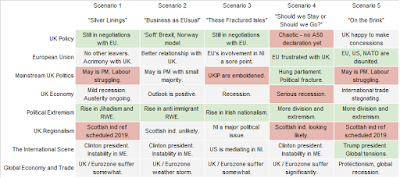Introduction
Just over a year ago, following the UK’s referendum on EU membership, Aleph Insights used a structured, driver-based scenario generation method to produce five possible futures for the UK in 2019. As we said at the time, these were not forecasts - we made no attempt to assign probabilities to them - but a planning tool designed for the testing of policy and strategy.
We will shortly be publishing an updated set of scenarios, again looking at the UK’s strategic priorities between now and July 2019, taking into account developments over the last year. However, there is a lot to be gained from revisiting past scenarios. Doing so can help diagnose possible biases, such as hindsight effects, groupthink, and other failures of imagination, to assist in their future mitigation. It can also give a useful insight into whether we are more-or-less where we expected to be, or in entirely uncharted waters. This article examines our scenarios from June 2016 to identify lessons for future planning.
Scenario Analysis
One significant benefit of explicit driver-based scenario approaches is that they deliver an audit trail in the form of a suite of assumptions for each scenario, enabling consistent comparison between the scenarios. The grid below summarises the assumptions underpinning each scenario, colour-coded according to whether each assumption now seems more (green) or less (red) likely to turn out to be broadly true, or whether there is no change (grey) in its likelihood. Of course, with two years still to go in the lifetime of the assumptions, it’s hard to be definitive, and the colour-coding should be viewed as largely subjective.
As a reminder, the headline question was this: “What will the UK government’s strategic priorities be on 1 July 2019?”. Consequently, the assumptions should be understood as referring to July 2019 - and not to today. (‘NI’ refers to Northern Ireland, and ‘RWE’ to right-wing extremism.)

Looking across the scenarios and assumptions, a few interesting points suggest themselves.
Our assumptions about the UK economy, the global economy and the international scene, have changed little in terms of their apparent likelihood, primarily because it’s too early to draw inferences about these factors only one year into the three year scenario timespan. Although our baseline assumption was for a Clinton presidency in the US, the outlook for other elements of these scenarios (an emboldened Russia, continued instability in the Middle East, and so on) have not thus far changed significantly.
We can, however, begin to rule out certain futures for UK politics and Brexit policy. All the scenarios assumed Theresa May would become Prime Minister, some specifying an election in 2017 - and Scenario 4 closely describing the actual outcome of a hung parliament - but none of them assumed that the Labour Party and its support would cohere so quickly behind Jeremy Corbyn. In terms of its outlook for the political scene, Scenario 4 is probably now closer to a baseline, although its assumption about significant resistance to Brexit is looking largely invalidated by events.
Our baseline assumption about UK regionalism broadly described a resurgent Scottish nationalist movement. After the 2017 election, this is now looking like significantly less of an issue. But our baseline assumption of a rise in jihadist and right-wing extremism is looking more likely in the light of recent events. At this stage in Brexit negotiations, it is difficult to tell whether the Irish border issue will become problematic or be deftly circumvented, but the Conservative Party’s alliance of convenience with the Democratic Unionist Party raises interesting questions that will be examined in our next set of scenarios.
Lessons
It is certainly too early to rule out any of the futures we described last year, at least when considering the general circumstances which they describe, rather than the specific details of each scenario. Although elements of every scenario have become less likely, and others more so, the new ‘baseline’ outlook is likely to be a composite of different aspects of all five scenarios. This illustrates a key point in, and advantage of, scenario analysis: given the uncertainty inherent in political forecasting, the ‘right’ answer is very rarely arrived at by picking a single favoured narrative and then basing our strategy on this scenario. Instead, the utility of scenario analysis stems from providing a means to test the robustness of our strategy against a range of different outcomes. If this sort of approach had been used more earnestly, is it possible to think that the UK would have been more prepared for a Trump victory, or Theresa May might have been less keen to call a general election?
Aleph Insights will be publishing the new suite of scenarios on this blog next week.
